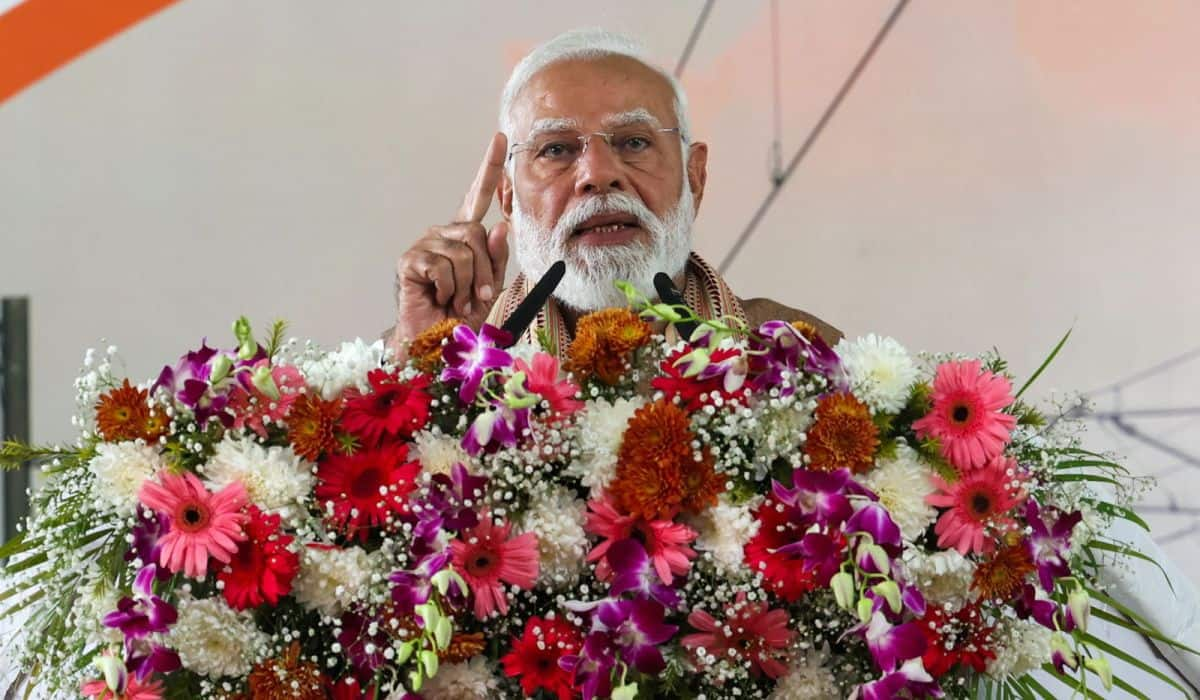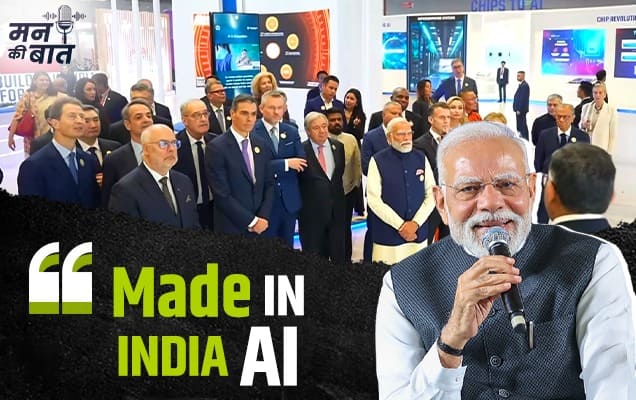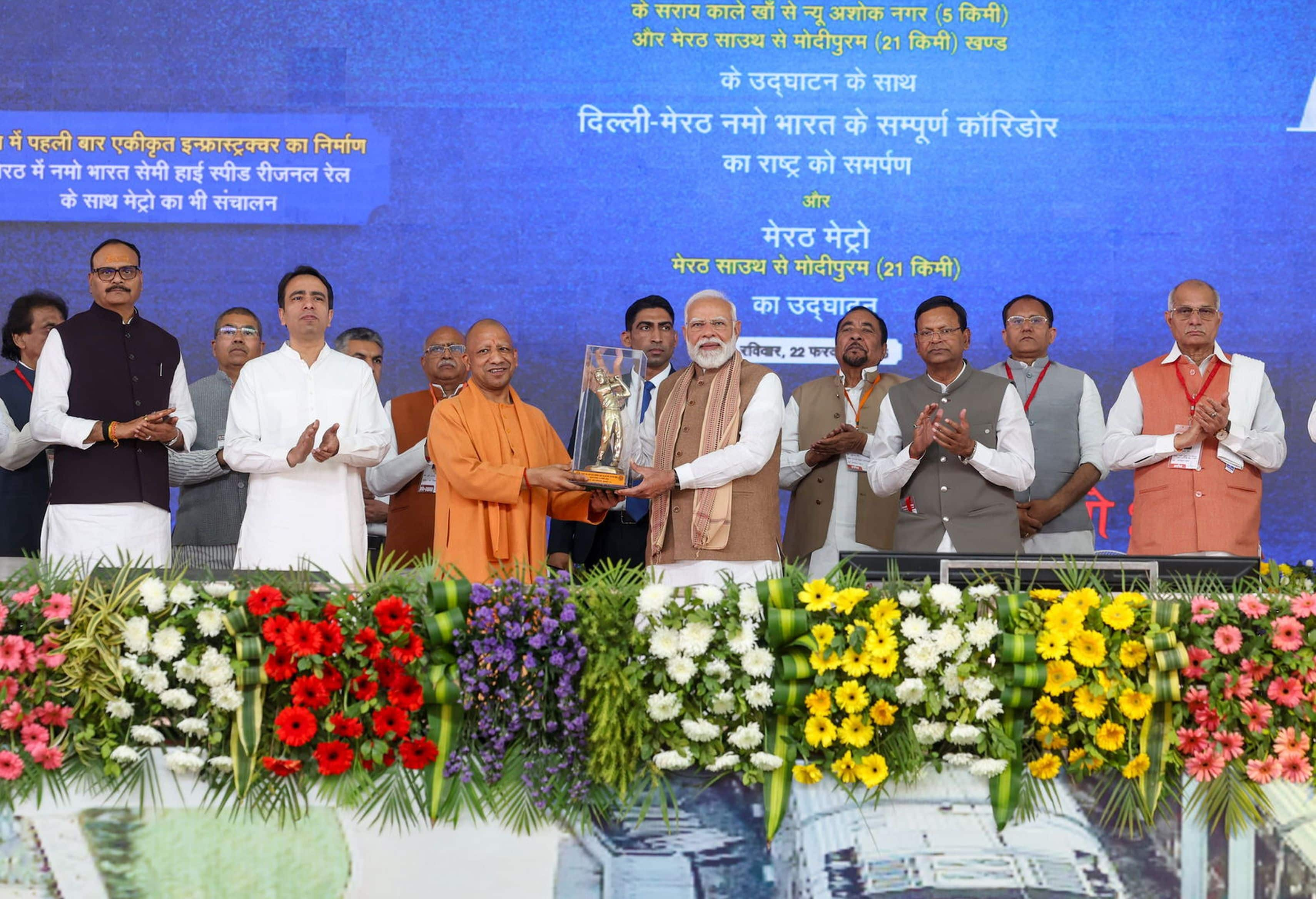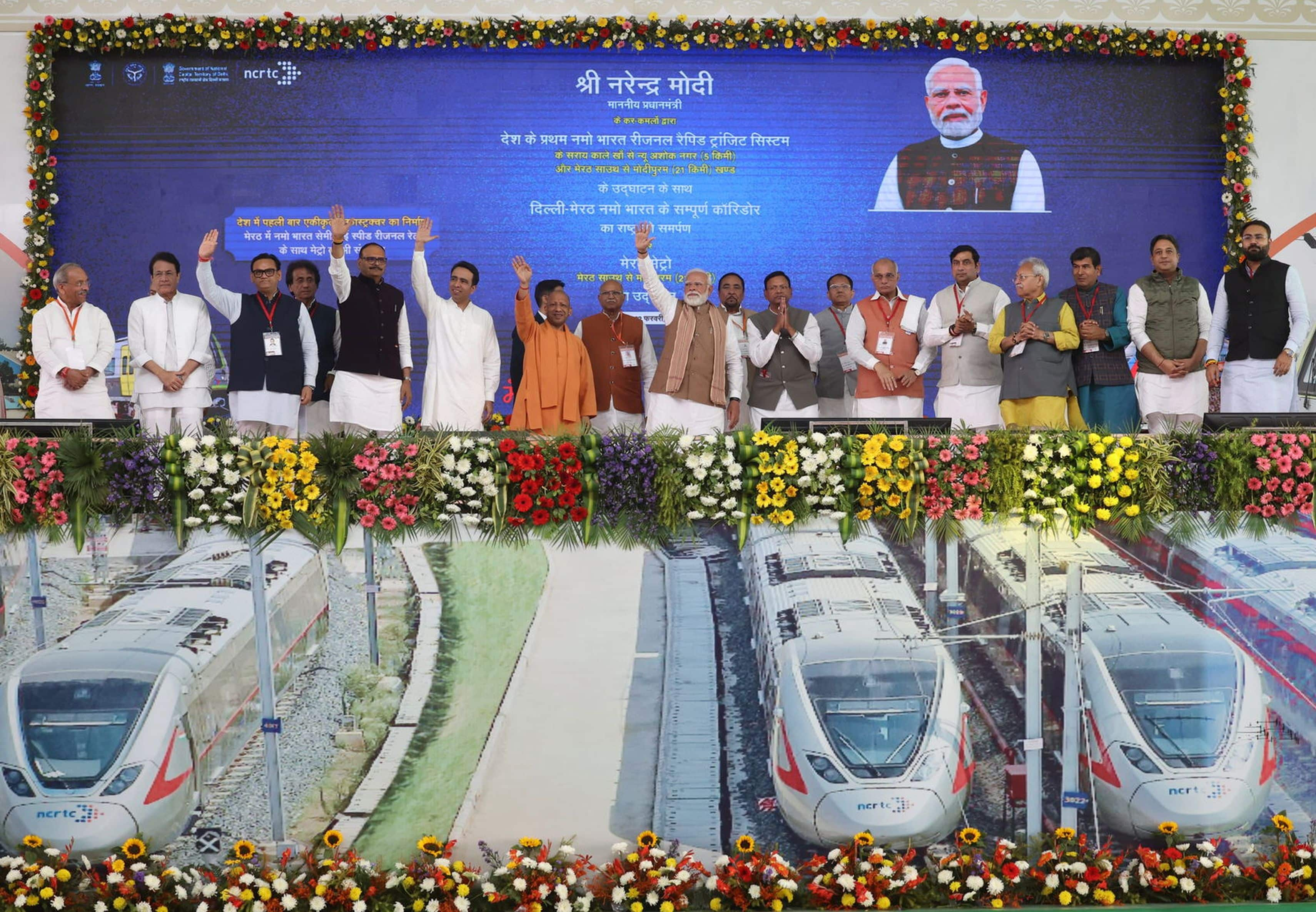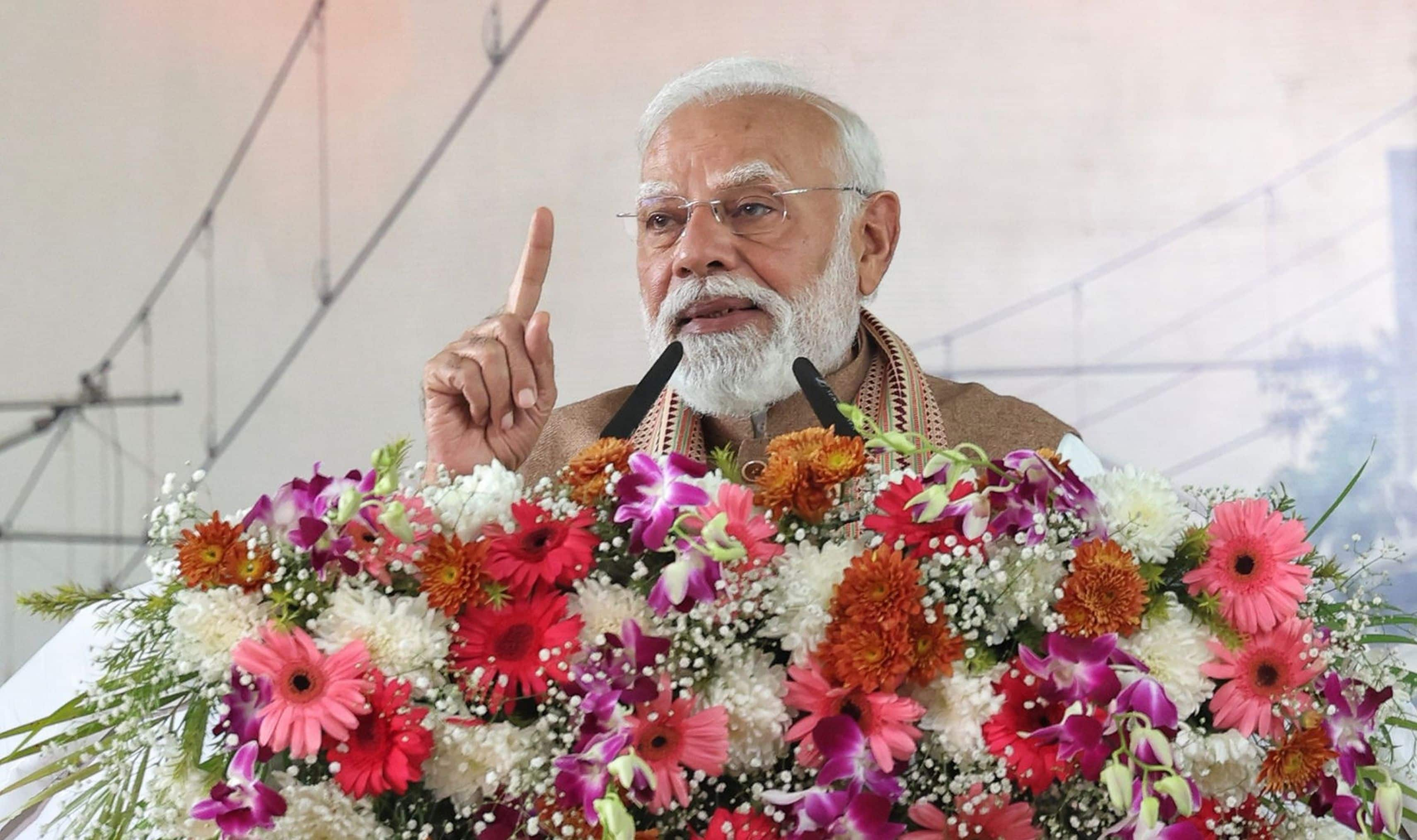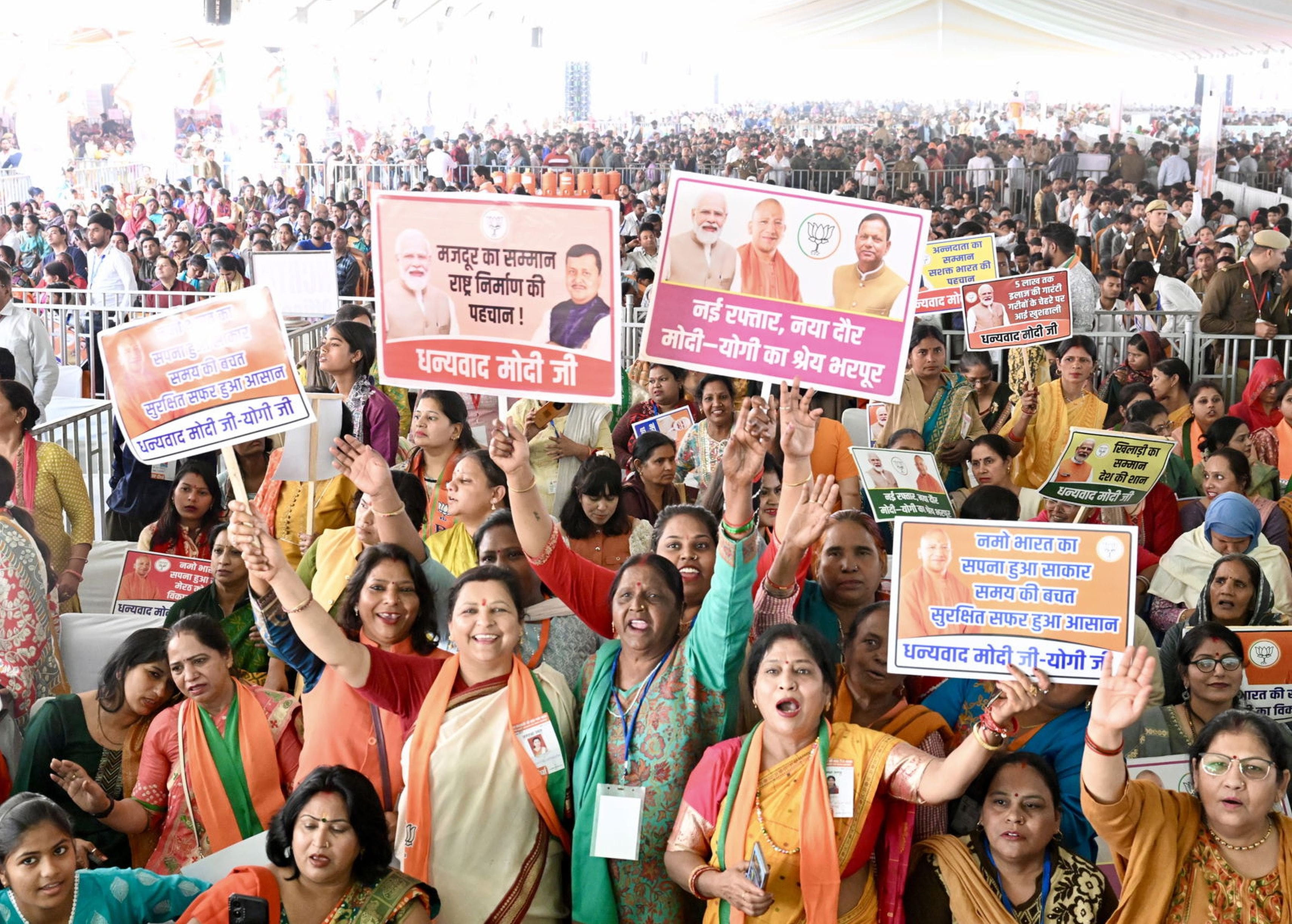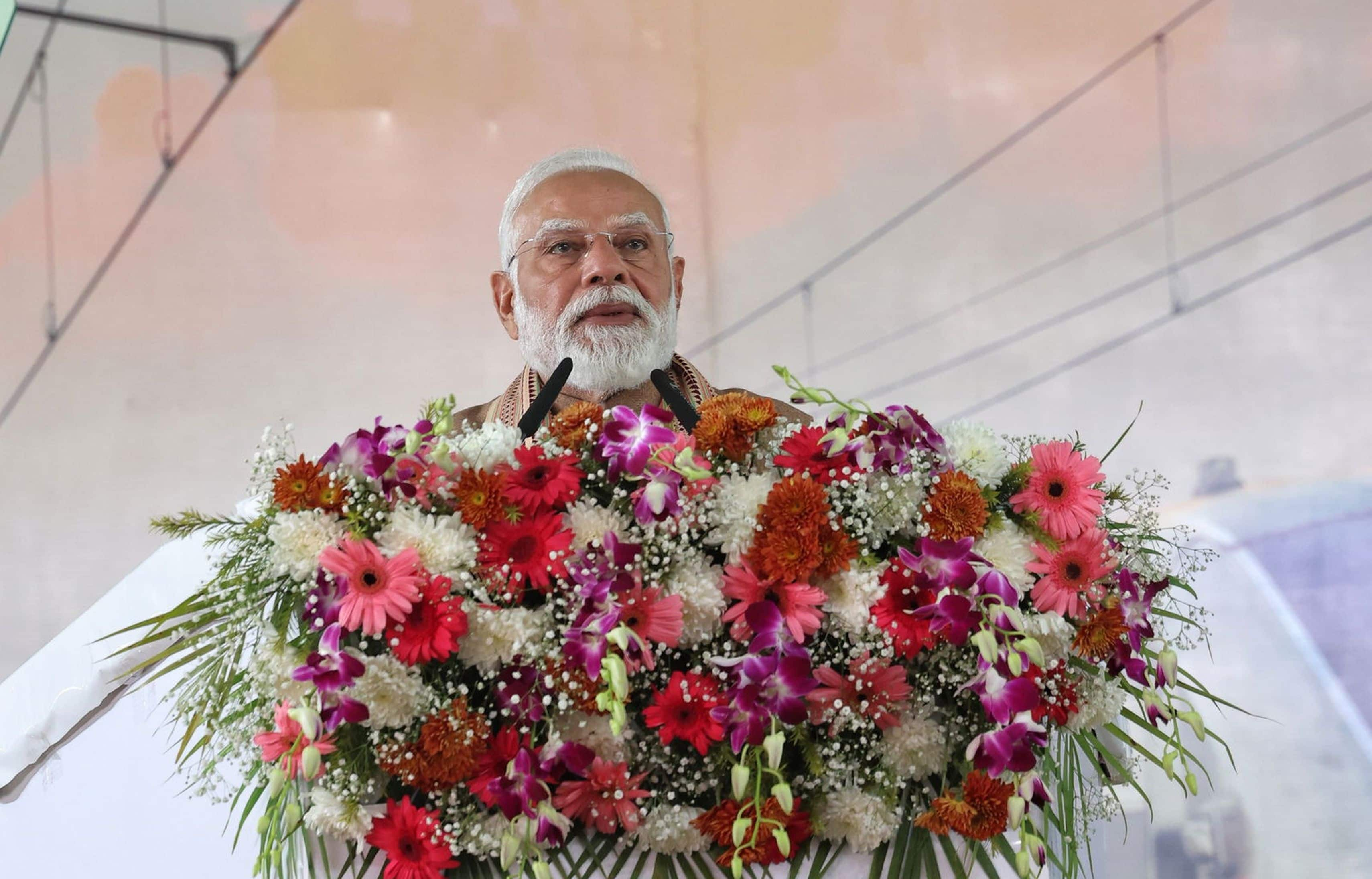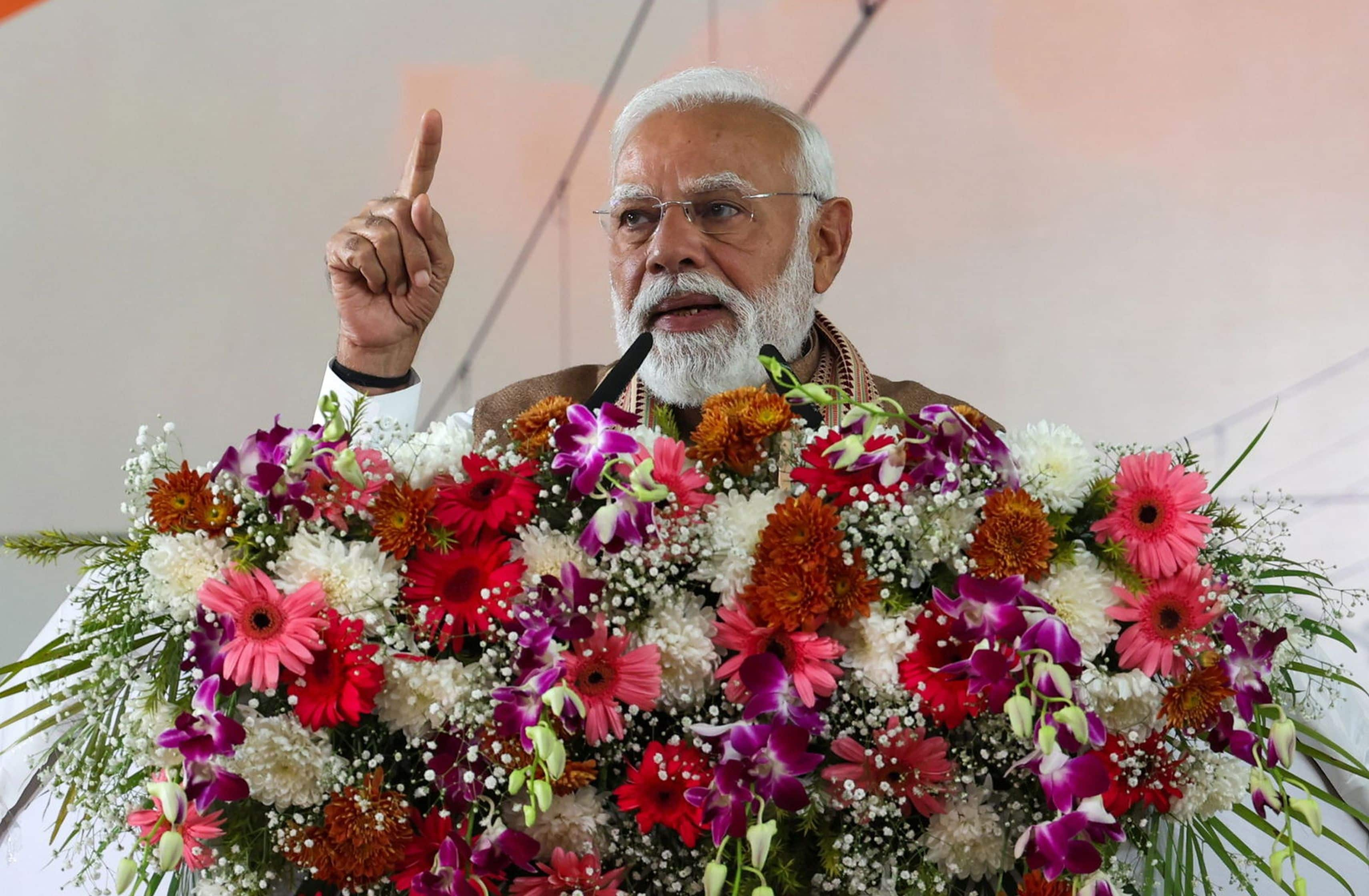Q. This is a question on trade, which, as you know, is often cited as one of the principal engines of economic growth. India, since you became Prime Minister, has decided not to go ahead and ratify the so-called Trade Facilitation Agreement. Also, India is, for the moment, outside both – APEC and TPP negotiations. So could you speak about your view of trade? And whether the domestic politics of India will allow you to pursue a liberal trade agenda?
A. जहां तक Trade facilitation का सवाल है, हम 101% agreed हैं। उसमें कोई दुविधा का विषय नहीं है, कयोंकि हम भी यह चाहते हैं। आज global economy का युग है। अगर global economy का युग है तो हमें हमारे infrastructure, हमारी facilities global standard की बनानी पड़ेगी। इसलिए हम भी मानते हैं कि विश्व के साथ हमको काम करना है। मेरे लिए Politics is not an issue at all. मैं लोकरंजक राजनीति वाला इंसान नहीं हूं। और नही लोकरंजक अर्थनीति वाला इंसान हूं। लेकिन मेरे देश में गरीब लोग हैं। गरीबों को भूखा रखकर हम नहीं चल सकते। और इसलिए food security और Trade facilitation - दोनों चीजें एक साथ चलनी चाहिए। ये मेरे देश का आग्रह है। ये पहले कर लो तो देखा जाएगा तो गरीबों के साथ अन्याय होगा। दुनिया को कोई तकलीफ नहीं है कि हम food security के लिए positive stand ले लें।
Q. This question deals with electricity. As I understand it, several hundred million Indians do not have adequate access to electricity. And the question a lot of people are asking is, how can these people come to enjoy a middle class life, and in the process, not set in motion economics that have a clearly negative impact on climate change given the amount of carbon that would be emitted?
A. यह बात सही है कि हमारे लिए आज बिजली जीवन में एक बड़ा महत्पूर्ण हिस्सा बन चुकी है। बिजली Luxury नहीं है। ये जीवन की Requirement बन गई है। और हम 24x7 बिजली पहुंचाने के लिए संकल्पबद्ध हैं। मेरी सरकार ने अपने Manifesto में कहा है, अपने Agenda में कहा है कि next 5 years में हिंदुस्तान के हर गांव में 24x7 power supply करेंगे। यह संभव है। हमने जिस प्रकार से energy sector में काम किया है, उसमें भी clean energy पर बल दे रहे हैं। हम solar के लिए Roof top policy लेकर के आ रहे हैं। और इसलिए हिंदुस्तान में अब बिजली का संकट रहेगा, ऐसी संभावनाएं बहुत कम हैं।
जहां तक Climate Change का सवाल है, शायद आप लोगों को जान के आश्चर्य होगा, मैंने पहले भी कहा, मैं गुजरात में जब था – Al Gore ने एक किताब लिखी है Inconvenient truth - मैंने एक किताब लिखी है, Convenient Action और वह मैंने Environment पर लिखी है। और जो किया जा सकता है, यानी political will से Environment friendly काम कैसे किया जा सकता है, वो मैंने उसमें सिद्ध करके दिखाया है। इसलिए Development and climate दुश्मन हैं, जो सोचा जा रहा है, गलत है। हम दोनों को Carefully Streamline करके आगे बढ़ा सकते हैं।
Q. Sir, India is, by many counts, the second largest Muslim country in the world in terms of population. Only Indonesia is larger. And as you know from your time here, America is seized by the challenge posed by the group ISIS. One of the questions that has been raised is whether you’re worried that the unrest sweeping large parts of the Arab and Muslim world might spread to India. And to the extent that you are, what are your plans to reduce your country’s susceptibility to radicalization and even violence?
A. जहां तक भारत का सवाल है, भारत में किसी भी संप्रदाय के व्यक्ति क्यों न हो, लेकिन एक मूल philosophy से वह drive करता है और भारत के philosophy के प्रतीक हैं भगवान बुद्ध, महात्मा गांधी। जहां अहिंसा, यह हमारे लोगों के स्वभाव में है। आपने देखा होगा, इतनी Terrorist Activity हमारे देश में चली। Terrorism के कारण हम परेशान हैं। लेकिन सारे Terrorist Activity हमारे यहां exported है। किसी ने हमारे यहां export किया है। Home grown नहीं है इसलिए हिंदुस्तान का जो मुसलमान है, उसके विषय में, मुझसे कभी एक बार CNN ने पूछा था, कि अल कायदा का ये जो चल रहा है, तो आपको क्या होगा, तो मैंने कहा था कि हिंदुस्तान का मुसलमान अलकायदा को फेल कर देगा।
Q. We hope so. Let me turn to foreign policy for a minute. For much of the Cold War, India’s articulated foreign policy was one of Non Alignment. And there was always the rhetoric of the five principles of co-existence. But as you know, and as everybody knows, the world is no longer aligned with the end of the Cold War. So what is India’s compass? What is India’s intellectual approach to this post-Cold War world when it comes to its foreign policy?
A. देखिए, हम 18th और 19th century की तरफ जाएं तो वह युग पूरा संघर्ष का युग था। हर शासक जो भी उसका दायरा होगा, वह अपने विस्तार के लिए लड़ाई लड़ता था। पूरे दो शताब्दी का इतिहास संघर्ष का इतिहास है, लड़ने का इतिहास है। बाद में आया इतिहास, समय जो आया, वह गुट का इतिहास आया। एक गुट ये, तो दूसरा गुट ये। ये आया। अब वक्त बड़ी तेजी से बदला है। 21वीं सदी गुट से चलने वाली नहीं है। और एक प्रकार से Irrelevant हुआ यह गुट। आज हर देश Inter dependent है। विश्व के सब देश को सब देशों की जरूरत हो, ऐसे युग में हम प्रवेश कर चके हैं। और इसलिए गुट या समूहों के द्वारा नहीं, सह-अस्तित्व के विश्वास को लेकर आगे बढ़ना पड़ेगा। इसलिए एक नई philosophy, हम चाहे या न चाहें, already, practically जगह ले चुकी है। सभी देश मान लीजिए जो लोग G-20 में होंगे, वही G-4 में भी होंगे। जो G-7 में होंगे वही G-9 में होंगे। यानी आप देख सकते हैं कि कोई ऐसा समूह नहीं बन पा रहा है। हर कोई हर जगह पे भी जगह बना रहा है तो जगत पूरा बदल चुका है। हम ये पुराने समूहों की कल्पना लेकर के चलते थे, उसमें से बाहर निकल जाएं और हम Inter-dependent world है, उसको accept करें। ये जगत तेजी से जुड़ा रह है। Technology ने जोड़ा है, हमारी अपनी आवश्यकताओं से जुड़ रहे है, और हमारी युवा पीढ़ी ने एक नए बदलाव को स्वीकार कर लिया है, इसलिए पुराने सारे parameters अब काम नहीं आएंगे।
Q. After this meeting here in New York, you are heading for Washington. You’ll meet with the President tonight, you’ve got meetings tomorrow. I expect one word you’re going to hear again and again and again is the word “partnership”. To describe the US-Indian relationship. So my question for you is whether you are comfortable with that word and to the extent you are or are not, what is your definition of the word “partnership” when it comes to India and the United States?
A. पहली बात यह है कि हर चीज में comfort नहीं होने की जरूरत होती भी है। अब पति-पत्नी में भी 100% comfort नहीं होता है। लेकिन उसके बावजूद भी एक लंबे समय तक Binding रहता है। कुछ चीजे हैं, जो भारत और अमेरिका को जोड़ती हैं। और वो है:
सबसे बड़ी चीज लोकतंत्र। Openness, सोसाइटी में जो openness है, वह दोनों के संस्कारों में है। तीसरी बात, आप देखिए अमेरिका - सारी दुनिया अमेरिका में आके बसी है, यह अमेरिका के character का हिस्सा है कि सबको assimilate करती है। और Indian, दूसरी दुनिया में बसा हुआ है। तो सारी दुनिया को assimilate करने की ताकत Indian में है। ये दोनों ऐसे character हैं, जो एक-दूसरे को जोड़ते हैं। और तीसरी बात है, आर्थिक। आर्थिक बात वो लेन देन का विषय रहता है। व्यापारिक संबंध रहते हैं कभी आपके फायदे में, कभी हमारे फायदे में। वह give & take formula के आधार पर चलते हैं। लेकिन दोनों देशों के लोकतंत्र के प्रति श्रद्धा दोनों देशों को जोड़कर रखती है।
Q. You’ve described what features India and US have in common. But another word you’re going to hear a lot tomorrow is “strategic partnership”. Do you have a vision for that partnership and how the US and India can work together on global and regional issues?
A. देखिए, अभी भारत और अमेरिका ने मिलकर के - शांति की दिशा में प्रयास करना, एक विषय है, लेकिन आर्थिक विकास को लेकर के - अभी हम मिलने वाले हैं तो उस विषय को भी जोड़ने वाले हैं। यहां पर जो रिसर्च होता है, उस रिसर्च का उपयोग, हो सकता है कि अन्य देशों के साथ मिलकर विशेषकर भारत के साथ मिलकर के, जहां पर उस रिसर्च के धरती पर उतरने में utility ज्यादा है, तो हम उन क्षेत्रों में भी काम कर सकते हैं। दुनिया की तरफ देखने का हमारा दृष्टिकोण, वो सिर्फ उपयोगितावाद पर नहीं है। मैं आज भी मानता हूं, कि भारत और अमेरिका के संबंध, अमेरिका के हित के लिए अमेरिका के संबंध और भारत के हित के लिए भारत के संबंध, उसके बजाय, अमेरिका और भारत मिलकर के दुनिया के हित में हम क्या कर सकते हैं अगर ये Base line बनती है तो हम दोनों की ताकत विश्व को बहुत काम आ सकती है। और मैं जब Mr. Kerry मुझसे मिले थे, तो मैंने इस विषय को बड़े विस्तार से उनके सामने मैंने प्रस्तुत किया था।
Q. Is Afghanistan one of the areas where you think we can work together in a productive way?
A. अफगानिस्तान, ये तो बड़ा example है। अफगानिस्तान, actually एक example है। भारत के बहुत लोग अफगानिस्तान में रहते हैं। और एक प्रकार से अमेरिका और India के Partnership ने अफगानिस्तान में बहुत बड़ा Role play किया है। हम भी चाहते हैं कि अफगानिस्तान स्थिर, लोकतांत्रिक तरीके से विकास की यात्रा को आगे बढाए। ये हम भी चाहते हैं। अमेरिका ने वहां जो security measures में मदद की, उसके कारण वहां एक stability मिली। आज भी हमारी कोशिश ये है। और जो अभी चुनाव होने के बाद नई सरकार वहां प्रस्थापित हुई है, उस सरकार में भी तालमेल करने में भारत और अमेरिका ने, दोनों ने मिलकर के बहुत ही सद्भावना अपनी प्रकट करते रहे हैं। और एक अच्छे नतीजे की तरफ अफगानिस्तान गया है। लेकिन हमने अमेरिका से यही Request की है कि आप जो, withdrawal वाला, defence के withdrawal का विषय है - इराक जैसी गलती नहीं करनी चाहिए। क्योंकि इसके बाद इतना तेजी से withdraw करने के बाद इराक का जो हाल हुआ, अफगानिस्तान में withdrawal की process बहुत slow होनी चाहिए। अफगानिस्तान को अपने बल पर खड़े होने देना चाहिए। तभी जाकर के तालिबान को उभरने से वह रोक पाएगा। और इसलिए अमेरिका और भारत दोनों ने मिलकर के अफगानिस्तान में पूरी तरह कंधे से कंधा मिलाकर के काम किया है।
Q. Mr Prime Minister, you set an admirable example for the world in June when you accepted the arbitration decision of a Law of the Sea Tribunal, even though it awarded most of the Bay of Bengal that was under dispute to Bangladesh. Would you be willing to submit your land border problems with China to arbitration or adjudication? The Chinese government has thus far rejected the use of arbitration or adjudication. The Philippines is now putting China to the test. Would India be willing to do something similar?
A. चीन और भारत दोनों सक्षम हैं, बातचीत के द्वारा अपनी समस्या का समाधान करने के लिए। चीन और भारत Direct बातचीत कर रहे हैं। इसलिए कोई अलग arbitration की आवश्यकता नहीं रहती है। अभी भी, चीन के साथ मेरे व्यक्तिगत संबंध भी अच्छे रहे हैं। चीन के राष्ट्रपति अभी-अभी आए थे। और Border dispute को हम मानते हैं, Border dispute है और कई बातों में हमने चर्चा की है। उस चर्चा को हम और आगे बढ़ाएंगे। लेकिन हम दोनों इस बात से सहमत हैं, कि हम मिलकर के बहुत ही जल्द इन समाधानों को करेंगे। इसलिए हमें arbitration की जरूरत नहीं पड़ेगी।
Q. You’ve often said that there is no compromise on the dignity of women. So given the enormous potential of Indian women, and the challenges they face everyday, what is your vision for a Made in India approach for ending gender-based violence and inequality? Is your government exploring the establishment of a Prime Ministerial task force or any other concrete milestones to be a global leader on this issue that is so fundamental to the lives of so many?
A. मैं आपका बहुत आभारी हूं कि आपने, जो मैंने initiative लिए, उसके विषय में अच्छे शब्द सुनाए। दुनिया के कई भाग ऐसे है, जहां देश का प्रमुख महिला नहीं बन पाती है। Prime Minister या President किसी महिला को बनना है, आज भी कई देशों में दिक्कत है, लेकिन भारत और एशिया के देश ऐसे हैं, जहां महिलाएं प्रधानमंत्री रही हैं। और आज मेरी Foreign Minister भी महिला हैं, सुषमा स्वराज यहां बैठी हैं। मेरी Foreign Secretary भी महिला हैं, सुजाता सिंह। और मेरी Cabinet में 25% women हैं, Cabinet Ministers. लेकिन इस बात से बात पूरी नहीं होती है। Women empowerment के लिए सबसे पहली बात है girl child education. हम लोग dedicated हैं, girl child education के लिए। और I would like to share my experience in Gujarat. मैं जब गुजरात में मुख्यमंत्री था तो मेरे यहां girl child education को जब मैंने जाना, पहली बार जब मैं मुख्यमंत्री बना। It was Painful for me कि गुजरात जैसे राज्य में girl child education का ये हाल है? फिर मैंने, मेरे यहां school शुरू होती है 15th June को। जबकि हमारे यहां temperature होता है 45 डिग्री। यहां पर 24 डिग्री में भी गर्मी लगती है। हम 45 डिग्री में वहां रहते है। तो 13, 14, 15 जून, मैं खुद गांव जाता था। मेरे पूरे मंत्रिपरिषद के लोग गांव जाते थे। सारे मेरे MLA, MP जाते थे। मैं घर-घर जाकर भिक्षा मांगता था और लोगों को मैं कहता था कि भिक्षा में आप मुझे वचन दीजिए कि आप अपनी बेटी को पढ़ाओगे। मैं खुद बच्चियों को स्कूल लेकर जाता था। और मैं 100% enrolment में सफल हुआ। When I was a Chief Minister, 100% मैं सफल हुआ। वहां पर मैं अटका नहीं।
मैं कहीं पर भी जाता था, Public function में, तो मुझे gift कुछ न कुछ देते रहते हैं लोग, वह gift देते थे। उस gift को मैं auction करता था। जब मैं मुख्य मंत्री पद से गुजरात से वापिस निकला, तो उस auction में मुझे 78 करोड़ रुपये Total मिले। 78 करोड़ रुपये मैंने girl child education के लिए दान दे दिया सरकार को। ये commitment है हम लोगों का। तो girl child education और मेरी सरकार का Agenda है ‘बेटी पढ़ाओ, बेटी बचाओ’ और उस दिशा में हम काम कर रहे हैं। दुनिया के कई देश हैं, जहां महिलाओं को Voting right पाने के लिए सालों तक संघर्ष करने पड़े। आंदोलन चलाने पड़े। Develop countries में भी women को voting right के लिए लड़ाई लड़नी पड़ी। भारत में women को election में भी 30% Reservation है। कोई भी Body होगी, 30% महिलाएं compulsory है। इतना हम forward looking देश हैं।
Q. You mentioned about the Jammu and Kashmir floods. I was originally born in Srinagar. Our families have obviously been tremendously affected. So my question, or rather request, is that Government of India should allow international organization to come in. Currently, there is a tremendous amount of bureaucracy in allowing international organization to come in.
A. पहली बात है कि दुनिया के कई देशों ने अपने आप कश्मीर को मदद पहुंचाई है। जब गुजरात में भूकंप हुआ था, गुजरात में भी अंतर्राष्ट्रीय community ने काफी मदद पहुंचाई थी। और ये तो बात सही है कि दुनिया भर में एक अच्छी चीज बनी है कि कहीं पर भी Natural Calamity होती तो सभी देश मदद करते ही हैं। जब पाकिस्तान में भूकंप हुआ था, तो मैं सबसे पहले, क्योंकि गुजरात उसके पड़ोस में ही है, तो हमने सबसे ज्यादा पाकिस्तान में मदद पहुंचाई थी। तो यह मानवता का काम है। सब लोग मानवता का काम करते रहते हैं।
Q. You’ve now been in office for 4 months. Is there any leader – whether in India or another country – about whom you say, “That’s someone who set a model that I would like to follow in my position as Prime Minister”?
A. मैं मानता हूं, ऐसा मैं कहूंगा तो कइयों के साथ अन्याय होगा, क्योंकि इतने सारे लोग हैं, हरेक से मुझे कुछ सीखना है। अगर मैं एक का नाम लूंगा तो 50 लोग नाराज हो जाएंगे। इसलिए मुझे दुनिया में जो भी अनुभवी लोग हैं, सबसे कुछ न कुछ सीखना है। और सबसे सीख करके मेरे देश के लिए मुझे अच्छा करना है। इसलिए मैं कहता हूं, दुनिया में जो श्रेष्ठ है, वो मुझे मेरे देश में लाना है।
Thank You.






